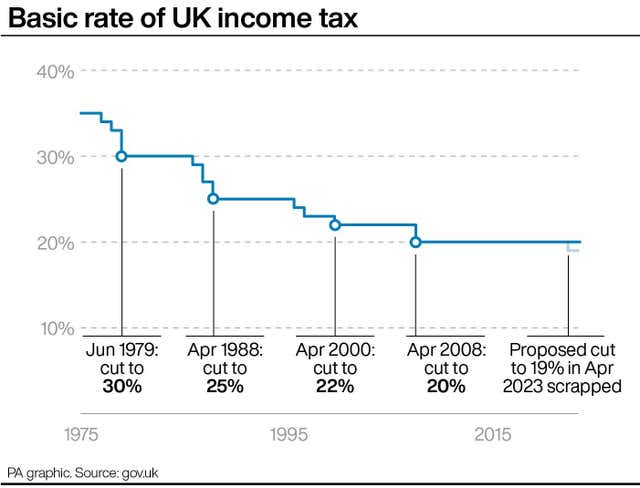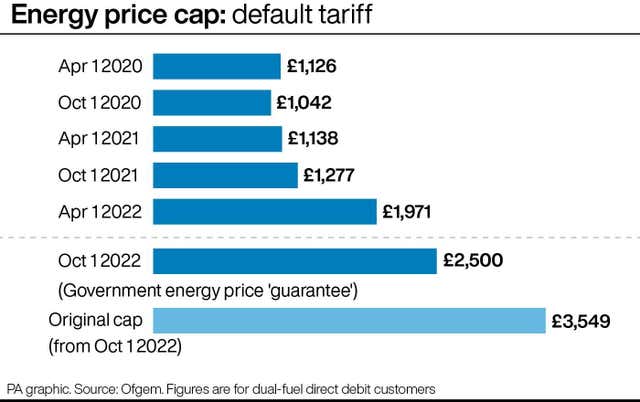
Henry Riley 4am - 7am
17 October 2022, 13:04

The new Chancellor has ditched promised tax cuts by his predecessor saying the basic rate of income tax will remain at 20p.
New Chancellor Jeremy Hunt has dramatically scaled back support for household energy bills and ditched tax cuts promised by his predecessor, Kwasi Kwarteng, as he seeks to restore stability following weeks of turmoil on the financial markets.
In an emergency statement, Mr Hunt said the energy price guarantee – which had been due to cap prices for two years – will end in April after which time the Government will look to target help for those most in need.
He said he is abandoning plans to cut the basic rate of tax by 1p – which had been due to be brought forward to April – and that it would remain at 20p in the pound until the country can afford to reduce it.
The cut in dividend tax promised by his predecessor will also go, along with VAT-free shopping for overseas tourists, the freeze on alcohol duty, and the easing of the IR35 rules for the self-employed.
Mr Hunt said the tax measures alone will bring in £32 billion after economists estimated the Government is facing a £60 billion black hole in the public finances.
In a televised statement, the Chancellor – who only took office on Friday – warned of more “tough” decisions to come.
“Governments cannot eliminate volatility in markets but they can play their part and we will do so,” he said.

Mr Hunt said he will continue with the decision to reverse the increase in national insurance contributions and a reduction in stamp duty, which are already going through Parliament.
However his statement represents an unprecedented overturning of the plans set out just over three weeks ago by Mr Kwarteng – with the enthusiastic backing of Liz Truss.
Since the mini-budget package of £45 billion of unfunded tax cuts caused chaos on the markets – as investors took fright over the massive expansion of borrowing – the Prime Minister has been forced into a series of U-turns.
She had already scrapped Mr Kwarteng’s plans to drop the 45p top rate of tax and to freeze corporation tax after the pound plummeted and government borrowing costs soared.
Mr Hunt’s statement sounded the final death knell for her free market experiment – dubbed “Trussonomics” – to kick-start economic growth through a programme of swingeing tax cuts and radical de-regulation.
It has left Tory MPs questioning how much longer Ms Truss can remain in office now that the central plank of her campaign in the leadership contest to succeed Boris Johnson has gone.
The Chancellor said: “It is a deeply held Conservative value – a value that I share – that people should keep more of the money that they earn.
“But at a time when markets are rightly demanding commitments to sustainable public finances, it is not right to borrow to fund this tax cut.”
Following his statement, Ms Truss tweeted that the Government was taking action to “chart a new course for growth that supports and delivers for people across the United Kingdom”.
The British people rightly want stability, which is why we are addressing the serious challenges we face in worsening economic conditions.
We have taken action to chart a new course for growth that supports and delivers for people across the United Kingdom. https://t.co/P3yglx6efZ
— Liz Truss (@trussliz) October 17, 2022
Angela Richardson became the fourth Tory MP to call publicly for Ms Truss to stand down saying she the problems with the public finances were “100% down to the Prime Minister”.
She told Times Radio: “I just don’t think that it’s tenable that she can stay in her position any longer. And I’m very sad to have to say that.”
While under current party rules Ms Truss is protected from a leadership challenge for 12 months, that could easily change if enough Tory MPs demand change.
Former chief whip Andrew Mitchell said the Prime Minister had just a fortnight to save her premiership.
“If over the next two weeks it becomes clear to the parliamentary party that the Prime Minister needs to change, or be changed, then the technicalities or the mechanism are not important,” he told Times Radio.
“The wish of the parliamentary party will assert itself… if she cannot do the job, she will be replaced.”

Ms Truss will meet the moderate One Nation Conservatives group in Parliament on Monday evening before an informal reception with her Cabinet as she battles to save her job.
Downing Street insisted the Prime Minister remains in charge despite Mr Hunt tearing up her entire economic strategy.
“The Prime Minister is listening to the public,” her official spokesman said.
“She is listening to advice on the markets, she is listening to her colleagues and she is making the necessary difficult decisions to change our approach so that we can provide the economic stability and indeed maintain that stability of leadership which is important.”
With discontent spreading across the party, the difficulty facing those MPs seeking change is the lack of a consensus candidate they can unite around.
Veteran backbencher Sir Roger Gale said “the last thing” the party wants is another leadership election following the contest over the summer to replace Mr Johnson.
“You have than got a situation, where if the Prime Minister were to decide her position was untenable and she went, then there would have to be I think a coronation,” he told Sky News.
“For that to happen you have to have an agreed candidate. At the moment I see no single agreed candidate within the party.”
The initial response of the markets to Mr Hunt’s statement was positive, with the pound strengthening against the dollar while government borrowing costs eased.
The Chancellor warned there will be more pain to come with a new squeeze on public spending when he delivers his full medium-term fiscal plan along with updated economic forecasts by the Office for Budget Responsibility on October 31.
“All departments will need to redouble their efforts to find savings and some areas of spending will need to be cut,” he said.
“Growth requires confidence and stability and the United Kingdom will always pay its way. This Government will therefore take whatever tough decisions are necessary to do so.”